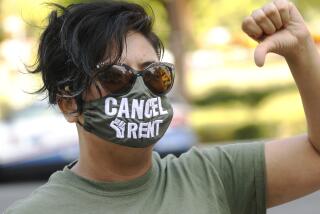Harassment Ruling Erases Key Defenses
A state appellate court ruled Thursday that employers can be held strictly liable for workplace sexual harassment by supervisors under state law--even if they took steps to correct the behavior or were unaware of it.
The ruling by the 3rd District Court of Appeal in Sacramento is a blow to employers, attorneys said, because it removes defenses to absolute liability established by the U.S. Supreme Court in 1998. The high court held that, under federal law, employers can escape liability if they show they have taken steps to prevent sexual harassment and promptly move to correct complaints, or if the employee fails to make a complaint.
The California suit was filed by Theresa McGinnis, who alleged she was sexually harassed by a supervisor in a state Department of Health Services office in Sacramento.
She claimed the supervisor, who has since retired, made lewd comments and inappropriately touched her.
McGinnis complained to a supervisor after talking to a colleague who told her she had been similarly treated. They each filed suits in March 1998, alleging the agency had failed to act on prior complaints from other workers.
In pretrial hearings, a Superior Court judge ruled that the agency would be held strictly liable if McGinnis proved her harassment allegations.
The agency appealed, seeking permission to assert defenses allowed under federal law.
The appellate court denied that motion Thursday, saying state law imposes strict liability, and sent it back to the lower court for trial.
As the first published opinion on the issue by a state court, it must be followed by lower courts throughout California and could be applied to other workplace harassment suits--including those involving race, disability and age--against both public and private employers, attorneys said.
âIt doesnât matter now whether the employer knew about the harassment or what action they took if they learned about it,â said Bill Quackenbush, a lawyer for McGinnis. âThere is simply no defense when itâs a supervisor who has engaged in the harassment.
âItâs a significant decision to say âThere is no defense.â It means that if it is a supervisor and we establish that there was unlawful harassment, then thatâs the end of the game for the employer. Itâs automatic damages.â
Deputy Atty. Gen. Barbara Morris, who represented the state, said agency officials had expressed interest in appealing but have not made a decision. âThis is an important case. What theyâve done is impose absolute liability on the employer,â she said.
Morris said state agencies take such complaints seriously, and the Department of Health was moving toward taking action on this complaint.
âIf she had found the behavior objectionable and had reported it to someone earlier and they had looked into it, thereâs a strong likelihood that the behavior would have stopped,â Morris said.
Joseph Beachboard, publisher of the California Employment Law Letter and a partner at Ogletree Deakins, a Los Angeles firm that represents employers, said the latest ruling takes away incentives created by the U.S. Supreme Court for workers to promptly report harassment.
âOne of the things the Supreme Court found very important was the concept that both employers and employees have a role in resolving harassment,â he said. âEmployers have to investigate and discipline, and employees have the obligation to bring it to the attention of the employer so they can do something about it. If they donât, they canât bring a lawsuit against the employer.â
But Christopher Whelan, who is representing McGinnis, said the new ruling is important because it helps protect harassment victims whose fear of job retaliation prevents them from making an internal complaint.
âWho are the people who are getting sexually harassed and not reporting it?â Whelan said.
âThey are the most terrorized and most vulnerable in the workplace. They need more protection and not less.â
More to Read
Sign up for Essential California
The most important California stories and recommendations in your inbox every morning.
You may occasionally receive promotional content from the Los Angeles Times.











